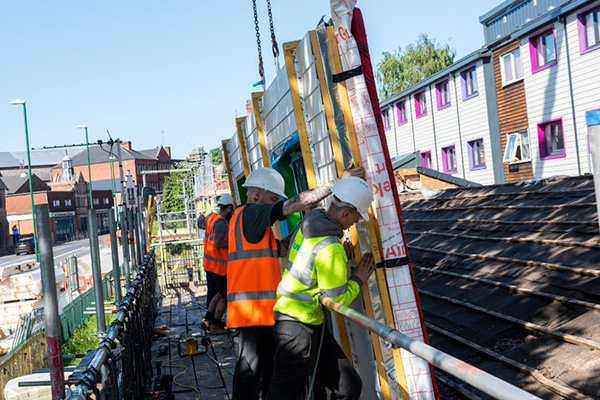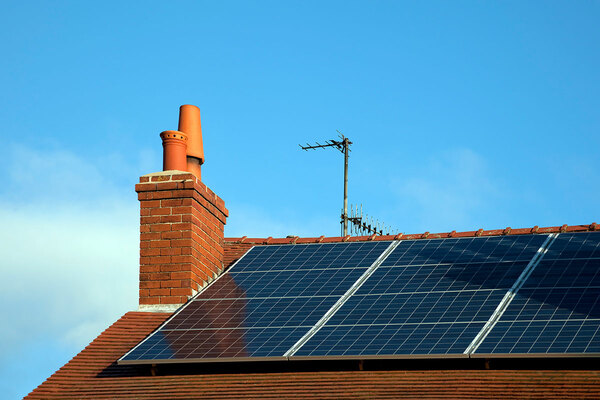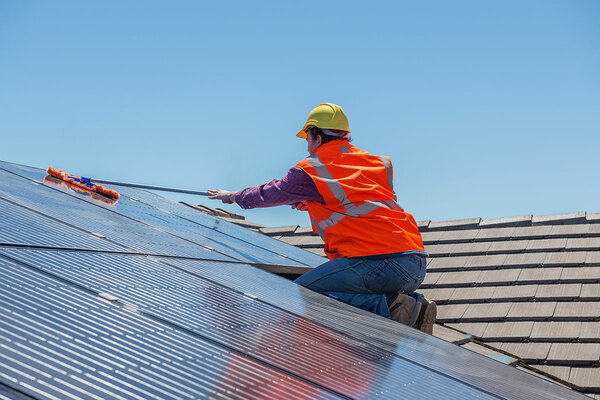You are viewing 1 of your 1 free articles
Climate Change Committee recommends bringing forward target to make all social housing EPC C by two years
Ministers’ target to bring all social housing up to an Energy Performance Certificate (EPC) of C by 2030 should be brought forward by two years, the government’s advisors on climate change policy have said in a major new report.

The Climate Change Committee’s (CCC) Sixth Carbon Budget report, published yesterday, recommended that all social homes be made energy efficient enough to meet an EPC rating of C by 2028.
Ministers set a 2030 target in 2017 as part of the Clean Growth Strategy.
The National Housing Federation (NHF) warned that the new target would be “a challenge” and that new support is required from government.
But the CCC’s report said government funding to improve energy efficiency in social housing stock is currently in line with projected costs over the next decade.
It pointed to the £3.8bn Social Housing Decarbonisation Fund promised in the Conservative Party’s manifesto and indicated the pot will meet the cost of bringing all homes in the sector up to EPC C over the next decade with a ‘green’ rating on its traffic light system.
That assessment is based on the CCC’s estimate that doing so will require between £3.1bn and £4bn, depending on whether floor insulation is installed in all fuel poor homes.
A spokesperson for the the committee told Inside Housing: “UK social housing stock is more efficient than other parts of the stock, so comparatively lower levels of investment are needed to raise the homes up to energy performance certificate C standard.”
Around 55.9% of social rent homes have an EPC rating of between A and C, compared with just 29.1% in the owner-occupied sector and 32.6% in the private rented sector, according to government data.
The report noted the funding would provide energy efficiency upgrades in five million social homes at around £500m a year.
It estimated that around 40% of this money would contribute to upgrades in households currently facing fuel poverty, but would not stretch to pay for further low-carbon heat investments without another £4bn becoming available to 2030.
The committee highlighted a “gap” in the funding available to install heat pumps in existing social homes between 2025 and 2030 – with a £2.8bn price tag and only “negligible” commitments to public spending on this area.
Ministers have committed to scaling up the fitting of heat pumps in existing homes and has made between £500m and £2bn available for the work across all housing stock through the Clean Heat Grant, Green Homes Grant and Home Update Grant.
Assessments are made against the CCC’s “balanced pathway”, which assumes moderate behavioural change and innovation over the next 10 years.
The findings come after exclusive analysis by Inside Housing showed the cost of retrofitting all social homes in the UK to net zero-carbon by 2050 could top £100bn.
Under the UK Climate Change Act, the UK must reach net-zero greenhouse gas emission by 2050 and the government must set a new carbon budget every five years, following advice of the CCC.
The Sixth Carbon Budget must be legislated by June 2021.
Lord Deben, chair of the CCC, said: “The Sixth Carbon Budget is a clear message to the world that the UK is open for low-carbon business.
“It’s ambitious, realistic and affordable. This is the right carbon budget for the UK at the right time.
“We deliver our recommendations to government with genuine enthusiasm, knowing that Britain’s decisive zero-carbon transition brings real benefits to our people and our businesses while making the fundamental changes necessary to protect our planet.”
Rob Wall, head of policy at the NHF, said: “Housing associations are committed to playing their part and cutting their carbon footprint.
“As the Sixth Carbon Budget recognises, behaviour change will be critical to meeting our targets and this is why our members have already begun engaging with residents to raise awareness and encourage the behavioural shift that is needed.
“The recommendation that all social homes should be upgraded to EPC band C by 2028 will be a challenge. The sector has already started work to make their homes more energy efficient but will need additional support from government to meet the new target, if accepted by ministers.”
Sign up for our asset management newsletter
Already have an account? Click here to manage your newsletters













